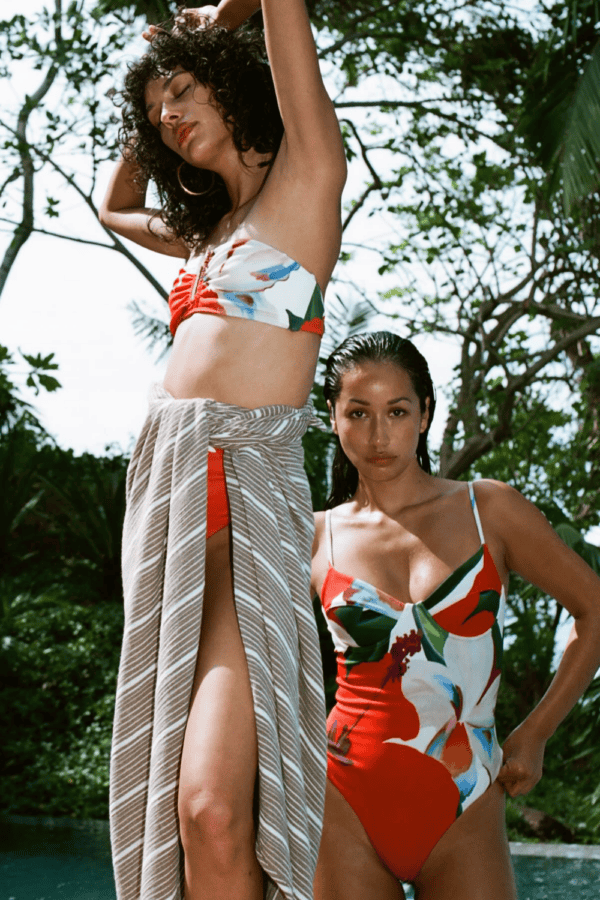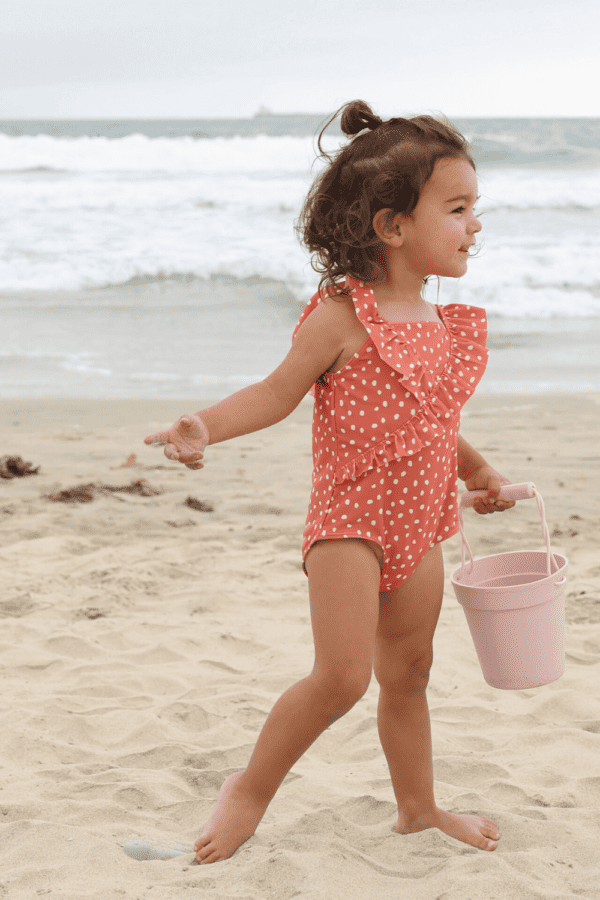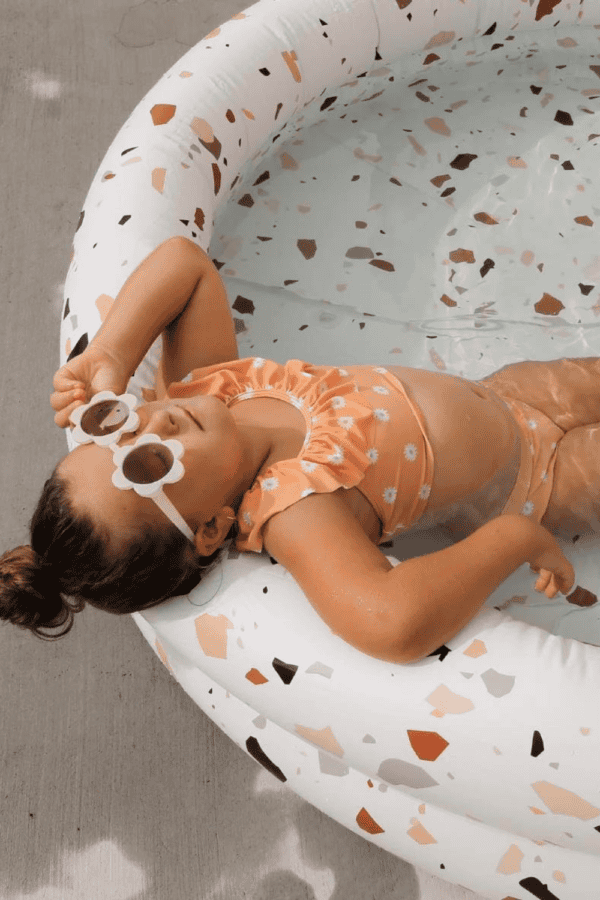In a Nutshell:
- Beach towels made with recycled plastic shed microplastics that are bad for humans, animals, and the overall environment.
- The best natural fabrics for a sustainable beach towel (that doesn’t include plastic) are organic cotton, linen, or hemp.
- While you can absolutely use a bath towel as a beach towel, there is a difference in how a beach towel is woven, the materials used, and the expected durability compared to a bath towel.
What's In This Guide:
- The 7 Best Sustainable and Organic Beach Towels
- 1. Coyuchi (my favorite overall)
- 2. Weezie (best for the whole family)
- 3. Stray & Wander (Turkish cotton beach towels)
- 4. Hilana (most affordable)
- 5. Outlier (best linen option)
- 6. Finisterre (organic changing robe!)
- 7. MINNA (best artisan made)
- What About Beach Towels Made From Recycled Plastic?
This guide contains affiliate links, which means we may earn a commission if you decide to make a purchase. As always, we only make recommendations that are genuine. Featured Image Credit: Weezie
Some of the best natural fabrics for beach towels are:
- Organic cotton: Soft, super absorbent, and grown and harvested in a more sustainable way than traditional cotton.
- Hemp: Very durable, water-absorbent, and requires less water to grow because it is naturally resistant to pests it requires little to no pesticides.
- Linen: Also super absorbent, breathable, and it dries quickly (while cotton tends to hold onto water for longer). Linen is also a hypoallergenic fabric that requires little (additional) water, pesticides, or fertilizers to grow with.
When it comes to beach and pool towels, there is no shortage of eco-friendly brands that are:
- Plastic-free (more on that below)
- Super absorbent
- Plush
- Durable
- Easy to travel with
- Kid-friendly
- Fun & colorful!
The 7 Best Sustainable and Organic Beach Towels
So if you want to go more sustainable, natural, and organic for your next trip to the beach, you’ve got plenty of great brands to choose from.
To curate these brands I’ve followed a few key criteria such as:
- Fabrics that are free from synthetics (especially including polyester and “microfiber”).
- The use of ethical practices throughout the manufacturing process (such as using Fair Trade certified factories)
- The use of non-toxic and/or natural dyes to color fabrics
- Third-party certifications such as GOTS, OEKO-TEX, MADE SAFE, and more.
Here are my picks:
1. Coyuchi (my favorite overall)

Price: $78-108
Material: Organic Cotton
Certifications: GOTS organic, MADE SAFE
A top brand for organic and non-toxic home goods, it’s no wonder one of my favorite eco-friendly beach towel brands is Coyuchi. Their towels are made out of 100% GOTS certified organic cotton that’s grown and woven in Turkey.
They have a few different collections:
- their Tomales towels, which are inspired by the gorgeous striped sarape blankets of Mexico
- their Mediterranean towels, which have a flat weave and a more traditional Turkish towel aesthetic if you like that
- and some lightly more plush, striped options (Morelia and Dawn Stripe)
(The Mediterranean collection is also MADE SAFE certified, which is one of the most strict certifications in terms of safety from toxins!)
These towels are not only made out of safe, natural materials, but they come from a brand I trust to manufacture truly high-quality goods AND they look beautiful in any space.
2. Weezie (best for the whole family)


Price: $78
Materials: Organic long-staple cotton
Certifications: OEKO-TEX
Weezie’s plush towels are made in Portugal using 100% organic long-staple cotton. They’re hypoallergenic and OEKO-TEX® certified, too.
Not only that, but these towels are cut and sewn in such a way as to minimize linting as well as the amount of sand they pick up. They carry several different colors and patterns, from sea foam green to bright yellow stripes.
They also have super cute cover-ups for kids to keep your little ones warm while they play at the pool or beach.
And if you want to make things extra personalized for the family, you can add your own monogram, too.
P.S. If you’re looking for more great options for babies and toddlers, check out this article for our favorite hooded towels for little ones. Even though they’re *technically* bath towels, you can easily take them to the pool or beach.
3. Stray & Wander (Turkish cotton beach towels)

Price: $50-$70
Material: Organic Turkish Cotton, Linen, Bamboo
Certifications: N/A
Stray & Wander has a great collection of lightweight beach towels that are made out of organic Turkish cotton. (Some of the varieties also contain a portion of bamboo or linen fabric.)
They have several different sizes and colors—some have tassels, some have stripes, some are brighter while others are more neutral.
Turkish towels are extremely water absorbent and great for traveling because they can fold or roll up easily without taking up a ton of space.
In addition to their regular beach towels, Stray & Wander also carries blankets, small towels (which can be good for little ones or for your hair), as well as “Roundies,” which are great for playing at the beach or in the backyard!
4. Hilana (most affordable)

Price: $30-45
Materials: Recycled Cotton, regular Cotton
Certifications: B Corp
Full disclosure: these towels are not actually organic. But they still make my list for a great eco conscious, plastic-free option because they’re more affordable and they’re made using 50% recycled cotton (combined with 50% regular cotton).
Hilana’s Turkish towels come in several different colors and patterns, whether you prefer bright stripes or solid neutrals. Their towels, which are finished with a stylish fringed edge, have a super soft and lightweight feel—so you won’t have to worry about using a lot of energy to carry yours to and from the beach.
This brand’s towels are also ultra-absorbent and dry quicker than a regular plush beach towel. That means less damp towels in your pool bag, in the car, etc!
Hilana is also a B Corp certified brand and all of their towels and blankets are ethically made by artisans in Turkey.
5. Outlier (best linen option)

Price: $88-$110
Materials: Linen
Certifications: N/A
If you’d rather go for natural linen towels rather than cotton, these ones from Outlier are the real deal.
First of all, linen is a great option for eco-friendly beach towels because flax (which is what linen is made from) grows quickly, doesn’t need pesticides and herbicides, and requires less water compared to cotton. Linen also naturally dries faster than cotton, which makes these towels a perfect fit for days when all you want to do is dip in the water again and again.
Specifically, these 100% linen towels from Outlier have a dimensional waffle grid weave, which means they dry even faster, weigh less, and pack so compact that you can use them most anywhere, “from beach to backcountry and of course in your bathroom.”
They’re available in three sizes, three colors (gray rock, summer blue, and raw flax), and they come with loops so you can easily hang them up on any hook.
6. Finisterre (organic changing robe!)


Price: $70
Material: Organic Cotton
Certifications: GOTS
Need to make a wardrobe change at the beach or pool? This clever robe/towel combo is made from super-soft GOTS certified organic cotton and eliminates the need for any embarrassing towel mishaps!
It’s got plenty of room so pretty much any family member can use it.
Oh, and it has a hood, too!
7. MINNA (best artisan made)


Price: $108
Material: Standard Cotton, Organic Cotton
Certifications: GOTS (some)
MINNA’s towels aren’t organic, but I’m including them here as a great plastic-free option because they have a lot of other things going for them.
First of all, they’re gorgeous! They’re handwoven in partnership with a cooperative of weavers in Nahuala, Guatemala, about an hour away from the beautiful Lake Atitlán.
These craftspeople use pedal looms to weave together 100% cotton fabric that’s colored using non-toxic dyes.
These towels are also super absorbent but lightweight, so they can be rolled or folded up seamlessly to store or travel with.
What About Beach Towels Made From Recycled Plastic?
A lot of beach towels on the market have traditionally been made out of conventional cotton and/or polyester.
As a virgin synthetic, polyester has a heavy environmental impact, so some brands started using fabric made from recycled plastic bottles instead. And while these recycled towels could certainly be considered a better option, they come with a few downsides, one of them being microplastics.
As we use and wash synthetic fabrics (including towels), tiny microscopic pieces of plastic shed from the fibers and wash into our oceans and other waterways. They’re not good for anyone involved in our eco-systems—the plants, critters, or humans. And as you can imagine, these plastics are really difficult to clean up.
In addition to the microplastic problem, here are some other things that make matters worse when it comes to recycled synthetics:
- There’s some indication that recycled plastics may actually be more toxic than virgin plastic.
- The process of recycling plastic into a new product is also toxic, contributing to air pollution in the communities where it’s done.
- Compared to natural fabrics, polyester and other synthetic fabrics are more likely to contain toxic chemicals such as heavy metals, BPA, and more.
Sometimes, completely avoiding synthetics is really difficult… But these are some things you may want to consider when it’s time to buy new beach towels. You might want to go with a more natural fabric that’s healthier for humans and the environment as a whole.
Is There A Difference Between A Beach Towel & Bath Towel?
Whether you’re thinking about using a hotel bath towel for your trip to the beach or you’re debating if you really need new towels, it’s best to know what the difference is between beach and bath towels (if any!).
Obviously, the most sustainable thing is going to be to use what you already have. But that might not be the case if you end up needing to wash your towels multiple times to get the sand out. After writing about both organic towels and organic beach towels I can say there are some slight differences that may make a difference to you:
- Size: beach towels are generally larger than bath towels and come in a larger variety of sizes.
- Materials: All the options included in this post are made from natural materials (cotton, linen, etc). But to make conventional towels dry faster, they are often blended with microfibers (which is usually something like polyester), along with other synthetic fabrics.
- Durability: The weave of a fabric can help with its durability. Beach towels are not only subject to more variety of uses, but they’re woven in a way to take sand into consideration (and keep it from sticking).
- Absorption: Bath towels are meant to absorb water very quickly but don’t necessarily dry quickly. Beach towels, on the other hand, are made to dry quickly, get wet again, then dry again.
- Thickness: Bath towels generally stay in one place (the bathroom/linen closet at home) and therefore are often thicker in texture. By contrast, beach towels are transported more often, and packed in suitcases and bags, and therefore it’s more common to see thinner fabrics and styles.
At the end of the day, the choice is yours!
Conventional beach towels often contain microfibers and synthetics fabrics that lead to microplastics that aren’t healthy for humans or our environment. So, the next time you need a beach towel for a day at the beach, you might want to choose from one of the natural, non-toxic, and eco-friendly brands above!
To get more non-toxic product picks, news, and more info delivered to your inbox once a week, sign up for Filtered Fridays.
Related Guides:



